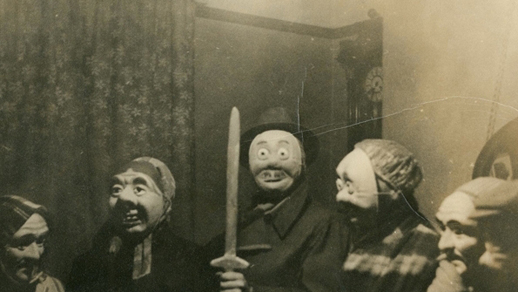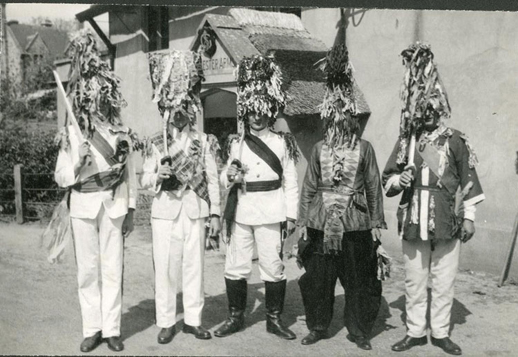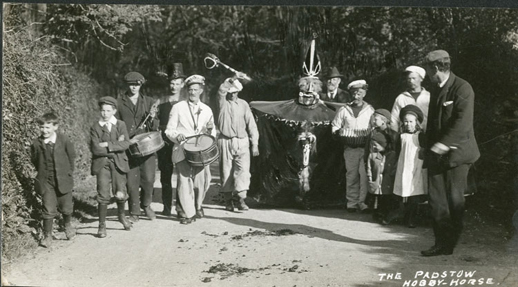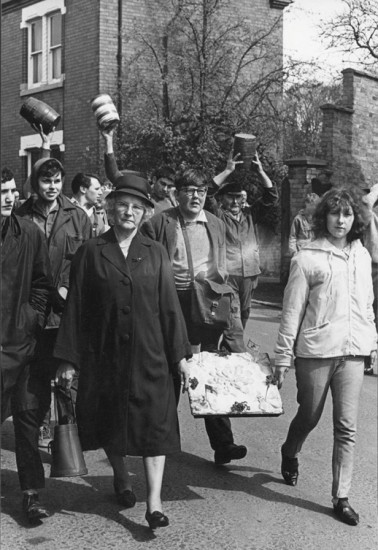
Here’s a Health to the Barley Mow, BFI, 2-disc DVD set
Reviewed by Neil Sentance
The British Film Institute does sterling work in conserving and making accessible the UK’s celluloid heritage. This sumptuous six-hour DVD set, subtitled A Century of Folk Customs and Ancient Rural Games and accompanied by a richly detailed booklet of notes and essays by folk historians and film archivists, should be of great interest to the Caught by the River audience.

Watching these 40-odd films is like taking a holiday in a strange and wondrous land, or maybe an afternoon spent leafing through CBTR-revered Country Bizarre. From Cornish May Day rites to fierce traditional football matches, children’s games on London’s bombsites to intricate sword and step dances, this collection of poetic documentaries, long-lost regional TV reports and silent newsreels invokes the nation’s powerful and enduring folk traditions. Much of what was recorded here was driven by the early twentieth-century efforts of Cecil Sharp and the English Folk Dance and Song Society, and some of the materials are among the earliest known records of folk customs on film. Partly in response to the emergencies and crises of nationhood of the 1930s and 40s, a new readiness to embrace the traditions of the past emerged in the 1950s, and led the BFI to support a number of the groundbreaking short films presented here. In the 1960s and 70s there was a countercultural shift of which the folk music revival was a part, providing a further spur to short-filmmakers’ recording of traditional performers. Concurrently, radio and television news (the successor to cinema newsreels) often featured folk celebrations of customs indigenous to the regions of these islands as a way of portraying local distinctiveness. The films collected here represent the outpouring of creativity and enthusiasm of the practitioners and filmmakers, and the community spirit of those involved. They reveal the country’s true genius loci, the spirit of place, through our connections with the past, with the land and with one other.

The material collated on these DVDs, painstakingly re-mastered by the BFI, is split into four sections: Dance and Song; Extreme Sports; Mummers and Hobbyhorses; and All Manner of Customs. For this review I take one film from each section as an example.
The Dance and Song section includes the 17-minute film that lends its title to the collection as a whole, Here’s a Health to the Barley Mow, from 1952. It documents the traditional singers of an archetypal English rural pub, The Ship, in Blaxhall, Suffolk, of the type now almost entirely consigned to the past, an unadorned place of ale tankards and indulgent landladies and spartan furnishing, of darts matches and cribbage games played in a fug of clay-pipe smoke. The noisy crowd is a mixed group, in age and sex – everyone knows all the songs, all the words, all the good company. The unsophisticated filmmaking techniques used do not detract from the film, but add to its honesty, its charming oddness to modern eyes. Folk music in pubs has survived, transmuted into various forms, but this film gives us Ur Folk, the real deal, and a moving record of a way of life from sixty years ago.
From the second section, Extreme Sports, is The Game of Haxey Hood, a brief silent grainy film from the Lincolnshire countryside of 1929. It depicts a game of traditional ‘football’ and the rites associated with it, a game with only a slender connection to the modern code that they play, without much recent success, at the City Ground in nearby Nottingham. The object seems to be getting the ‘hood’, a rolled up piece of leather, to the ‘goal’ – almost inevitably, the village pub. It’s a game that’s bound up with agrarian rhythms, customarily played on 6 January, or Plough Monday, traditionally the first day of the farming year. The twelve-man teams comprise ten Boggins, a Chief Boggin and Fool, who engage in a well-practised routine before the melee begins. Did I go and see this mad spectacle as a small child? Was it all a slightly unsettling dream? The Grandad who might have taken me is no longer around to ask, but the image of strange drunken figures rucking over the crisp flatlands on a winter’s day seems to have iced into the memory . . .

The third section is Mummers and Hobbyhorses, and here is the wonderful Oss Oss Wee Oss, a 1953 film from the great American folklorist and pioneer oral historian Alan Lomax, recorder of Lead Belly, Woody Guthrie, Muddy Waters, among many others. Commissioned for the 1951 Festival of Britain, this gloriously photographed film, rendered in vivid colour, portrays the May Day parades of Padstow on the north Cornwall coast. The ‘Oss’ is a hobbyhorse, the subject of much play and merriment from first light till gone dark, a tradition that thrives to this day. It’s tempting to see the England on display here as some kind of prelapsarian world, full of the poetry of an age-old culture untouched by the wars and new technologies of the century. It is at the same time poignant and exciting – Lomax described Padstow’s May Day customs as a ‘sexy, savage springtime rite’. The dancing of the young men in the film seems very ahead of its time for this pre-rock’n’roll era.
Finally, from the fourth section, All Manner of Customs, is One Potato, Two Potato, an important exemplar of late 1950s Free Cinema, a kind of proto-indie film movement inspired by the notion of freedom from the demands of box office and cinematic orthodoxy. The Irish educator Leslie Daiken set out to catalogue children’s street games, rhymes and play in the alleyways, parks and playgrounds of a still visibly war-scarred London. This evocative film has a wonderfully unprompted feel, with the inborn poetry of the children’s voices forming the narration, and the natural sounds of play highlighted by an inventive musical score. Many of the games and songs shown here can still be seen and heard in schoolyards – I see some of them at my own children’s rural primary school in West Dorset.

Indeed many of the songs, dances, games and customs in these films are alive and well, performed and practised across the country. Folk music is having another of its periodic resurgences; interest in traditional dance is strong – witness the clogging revival, promoted by, amongst others, the Unthank sisters, and conductor Charles Hazlewood’s recent flashmob clog dance in Newcastle. Passionate people countrywide are still coming together to express their ceremonials, continuing traditions once felt in danger of being shunted into dark corners. These marvellous films display a rich pageant that we may hope long remains.
Here’s a Health to the Barley Mow is available from our shop, priced £14.99